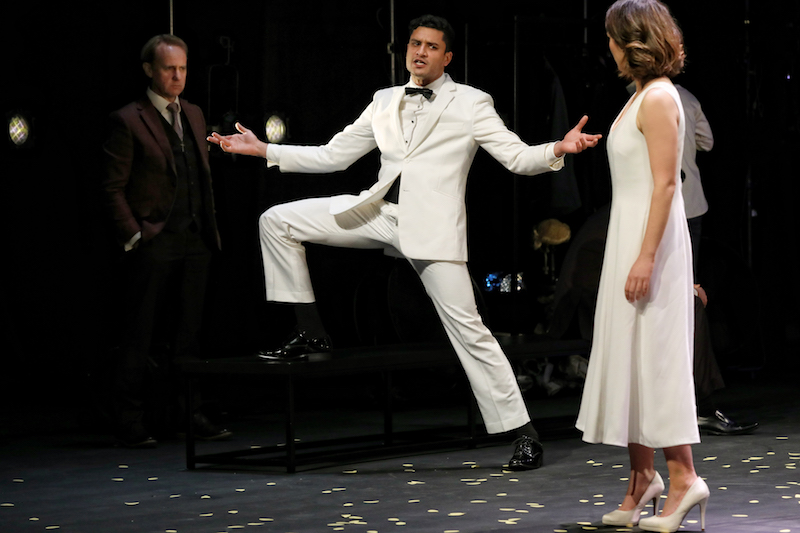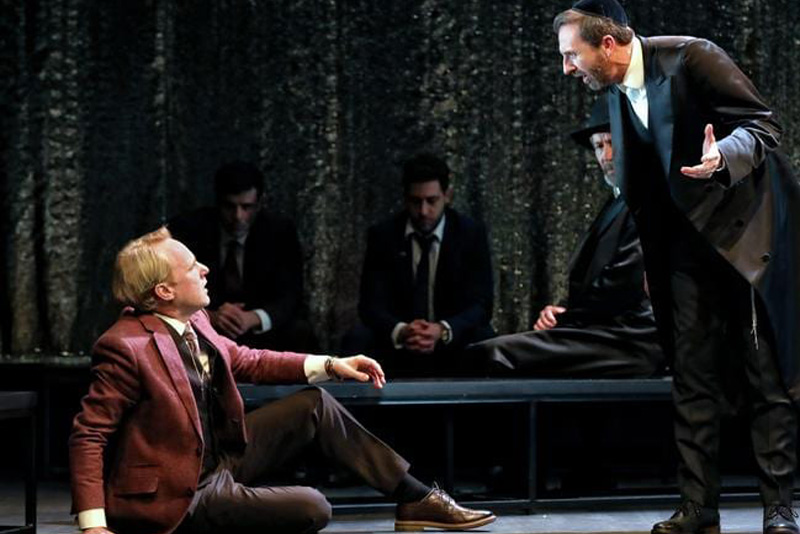“The Merchant of Venice”: The Bell Shakespeare Company
Margaret Leask in Sydney
10 August 2017
The Bell Shakespeare Company’s production of The Merchant of Venice, directed by Anne-Louise Sarks, was in excellent shape for its four-week season at the Playhouse, Sydney Opera House in October and November 2017. Before, it toured 25 venues throughout Australia, which began in early July 2017, and included capital cities and regional venues throughout New South Wales, Victoria, Western Australia, Queensland, Northern Territory, Tasmania, and the Australian Capital Territory. Well played in by the time it reached Sydney and with a strong central performance from Mitchell Butel at his best as Shylock, it made no bones about Shakespeare’s fiercely anti-Semitic theme and the cruel attitudes of his characters. As appropriate for a touring production, Michael Hankin’s simple set and modern costumes, enhanced by Paul Jackson’s lighting, involved the cast in managing quick scene changes and establishing a variety of settings in Venice and Belmont, using a few benches, rostra, and props.

Jo Turner, Shiv Palekar and Jessica Tovey. Photo credit: Prudence Upton.
The actors remained on stage throughout, sitting on the benches in a semi-circle at the back of the playing area. Sometimes they were part of the scene, at other times they were simply observers sitting under or near a full-leafed, autumnal tree. Costume changes were made in full view at clothing racks set stage left. A shimmering gold backdrop provided an effective contrast to the muted black, grey, and off-white colours of the costumes.
Sarks’ production was fast paced, intelligent, and uncompromising. Although allowing the dark humour and bawdy and romantic moments to be relished by the cast, particularly in the casket scenes where Portia (Jessica Tovey) and Nerissa (Catherine Davies] were recklessly prankish, Sarks’ treatment was focussed on the tense relationships and prejudices between the haves and the have-nots. None of the characters were very likeable or attractive; the Christians, particularly Jo Turner’s Antonio, were unpleasantly prejudiced and arrogant; they openly enjoyed egging each other on with their anti-Semitic responses to Shylock as he became isolated by grim determination, betrayal, and reversal of fortune.
Some of the racism seemed ingrained and even unconscious and instinctive: at times, Tovey’s Portia was apparently unaware of her off-hand cruelty, expressed as wit. Through Butel‘s subtle portrayal of Shylock’s humanity, the audience’s sympathy fluctuated. His dignified and angry reading of “does not a Jew bleed?” was moving and ultimately heart wrenching; it made the audience uncomfortable. His response to daughter Jessica’s betrayal (and Felicity McKay’s final, unspoken, ashen-faced realization of her contribution to his ruin and humiliation) were devastating.
Bell Shakespeare Company generally attracts a younger audience than is usual for productions of Shakespeare. This is not only because school texts inform the company’s repertoire but also their audience anticipates the clarity, humour, honesty, energy, and speed the actors and directors bring to the text. The audience also seek the inclusive nature of the experience: there is always a close relationship between them and the stage.

Jo Turner and Mitchell Butel. Photo credit: Prudence Upton.
In this production Jacob Warner, as an exuberant Launcelot Gobbo, Shylock’s clerk and later Bassanio’s offsider, ad-libbed to a latecomer and talked or clowned directly to the audience. Actors frequently play more than one role in productions. Shiv Palekar doubled as Jessica’s lover, Lorenzo, and as the Prince of Morocco. His confident, preening Morocco was a highlight. In the casket scene, he was apparently totally oblivious to Portia and Nerissa’s blatantly unwelcoming attitude and left the experience none the wiser. Eugene Gilfedder’s slightly camp, arrogant Prince of Arragon, was given similar treatment, leaving him somewhat bewildered. Gilfedder also played Tubal, a Jewish friend of Shylock’s and the Duke of Venice. The text was cut and adapted (by dramaturge Benedict
Hardie), leaving just a trio of friends: the merchant Antonio (Jo Turner); his kinsman, Bassanio (Damien Strouthos), needing money to woo Portia; and Gratiano (Anthony Taufa), to carry the story of borrowing money from Shylock, the bond of a pound of Antonio’s flesh, and the wooing of Portia and Nerissa.
In this version, Antonio (Turner giving a focussed, strong performance), distracted by an unrequited love for Bassanio, was depressed; his bad mood, combined with arrogance, influenced his decisions and interaction with the Jewish characters. Bassanio’s ego and immaturity were foremost in Strouthos’ performance, while Taufa was busy, flamboyant, and everywhere! Max Lyandvert’s composition and sound design added emotional nuance to the darkening perspective as Shylock, in a situation impossible to win, became the victim, even if dignified to the end.









